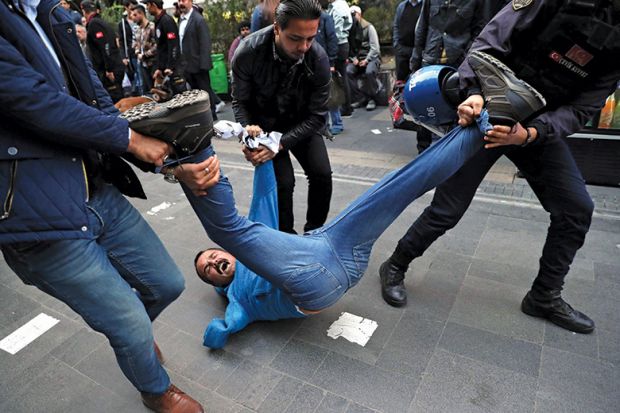Many of us take for granted our freedom to express opinions and to sign petitions about various social and political issues, including those that criticise government policy.
This is no longer the case for people in Turkey, including academics. The most egregious example is the punishment meted out to the 1,128 scholars, including several fellow psychologists within academia, who signed the so-called “Academics for Peace” petition in January 2016.
Many people will have already heard about the devastating consequences that signing this petition has had on individuals. But sitting in front of my fellow psychologists in an Istanbul court and seeing how their support for that petition has upended their lives was like being drawn into a world that only Kafka could conjure up.
To be clear, this petition from January 2016 was calling on the Turkish government to seek a peaceful resolution to the violent conflict in the Kurdish region.
Last week, together with other national and international colleagues, I joined a short trip to Istanbul to represent the International Society of Political Psychology as an observer at a colleague’s trial.
On arrival at Istanbul Atatürk airport, we were welcomed by a local colleague. She had recently been dismissed by government decree from her position in the Ministry of Science without the farce of a court trial.
The reason for her dismissal: she was a signatory to the peace petition. And losing her job was not all that she suffered: her passport has been revoked, and her pension rights and access to social benefits have been denied, so she is having to pay for the treatment of her sick five-year-old child at the public hospital. She now has virtually no income; nor does her husband, who has been long-term unemployed.
At dinner time, we met other colleagues who had signed the petition and had already felt the repercussions or were expecting to soon. One colleague was not a signatory but had found that she could no longer tolerate her corrupt university culture and the harassment it engendered and had consequently resigned from her academic position.
The next day, we observed our colleague standing trial in court. Her “crime” constituted “treason” and “connection to a terrorist organisation”. The sole evidence for these accusations: being a signatory to the peace petition. If found guilty, she might spend seven years in prison.
Her case was adjourned to later in the month on account of insufficient preparation by the court.
The Turkish government’s agenda is clear. Deprive its critics of their livelihood. Deprive them of their personhood. As academics, our professional identity defines us most prominently. Putting myself into my colleagues’ situation in Turkey means facing a devouring void instead of a precious professional identity, while trapped by poverty and the inability to care for those you love.
I am deeply concerned for our colleagues’ mental and physical well-being in Turkey, especially given that the literature and my own research have identified entrapment – feeling trapped – as one the most potent predictors of suicide.
Since returning to the UK, I have been haunted by the thoughts of what a junior male colleague in Istanbul might do given that he spent almost an entire day with us but without speaking. As a signatory, he had lost his PhD studentship and had had to sell his personal goods to cover his living expenses for the time being. Reports of deaths by suicide in the aftermath of the Turkish government’s state of emergency and dismissals do not bode well.
What can we do? During this short trip to Istanbul, our colleagues in Turkey reminded me of the importance of solidarity.
An expression of solidarity can have an impact even if it is as small as being present at the court during trials so that the smug prosecutors would be less rude to our colleagues and to their lawyers; as small as listening to and giving witness to our colleagues’ personal experiences; or as small as discussing potential research collaborations with them to reinstate their professional talents and identities.
Beyond that we, members of the International Society for Political Psychology, are planning to create an emergency fund to financially support colleagues who have lost their jobs.
We will also encourage our universities to offer colleagues in Turkey visiting fellowships so that they can continue their academic work and be part of a supportive community.
For those who cannot leave Turkey, UK universities can offer honorary positions with online access to their university library and other research resources. Importantly, as citizens of the United Kingdom we can call on the British higher education minister to demand from the Turkish government the return of the right of academic freedom to our colleagues in Turkey and to cancel all dismissals immediately.
Masi Noor is a lecturer in psychology at Keele University.
请先注册再继续
为何要注册?
- 注册是免费的,而且十分便捷
- 注册成功后,您每月可免费阅读3篇文章
- 订阅我们的邮件
已经注册或者是已订阅?

